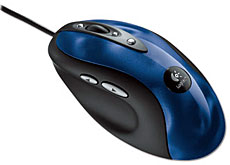Lessons from the “mouse that roared”

Daniel Borel, the co-founder of computer mouse maker Logitech, is one of Switzerland's best-known businessmen – and a role model for entrepreneurs.
In an interview with swissinfo, Borel talks about innovation, the strengths and weaknesses of the Swiss – and why people like him should not be allowed to vote.
Borel, the keynote speaker at the presentation of this year’s Zurich Cantonal Bank-sponsored Pioneer Prize, served as Logitech CEO until 1998 and is now chairman of the board.
He is also known as the founder of the SwissUp university ranking system.
The global leader in the “mouse market”, with corporate headquarters now in California but a strong continued presence in its native Switzerland, Logitech’s success dates back to a major deal with Hewlett-Packard nearly 25 years ago.
The company, which is still best known for its mouse but produces a range of other products, has built its position on a tradition of innovative engineering, clever marketing – and a decision to avoid direct competition with main rival Microsoft.
swissinfo: If you were 20 years old again and thinking of founding your own company, what kind of company would it be?
Daniel Borel: I would love to be 20 years old again, because I think the world today is more open and exciting than ever before. As for Switzerland, it has been developing new expertise in certain areas – particularly biotechnology. There are also at least initial developments in the world of nanotechnology, though that is an area where I am not so knowledgeable.
swissinfo: Would you start your company here in Switzerland?
D.B.: I don’t think the issue of location is so important per se. For instance, even for Logitech today, we often still find the best engineers in Switzerland. The [best Americans] might go directly to Microsoft or Intel or wherever. So where you want to be is largely based on what size and type of business you are, and whom you can attract.
On the financial side, Switzerland is also pretty good. It is obviously not Silicon Valley in terms of venture capital, but there is plenty of money. So Switzerland can be a good place to start – then you grow and conquer the world.
swissinfo: What in particular do you think the Swiss do well?
D.B.: They tend to be good at developing products at the intersection of different technologies. By education, we are trained to look at many different fields. If I take the example of engineers, when you graduate you know software, hardware, mechanics, optics – very broad knowledge. [US engineers] might be better in more specific fields, for instance semi-conductors or software.
swissinfo: So education is a key issue when it comes to differentiating Switzerland?
D.B.: Absolutely. Switzerland must look at education not as an expense, but as an investment in the future. This is the way we will maintain our high standard of living; we have to create added-value jobs, and we have to aim for the best.
swissinfo: And what are the areas where the Swiss need to be better – or to do things differently?
D.B.: I think the environment here is not very good for entrepreneurs. People here do not like failure; they are rather risk-averse, quite provincial, and not always exposed to the world of competition. People would still rather work for a large company than start their own.
swissinfo: Do you think this attitude played a role in developments at national airline Swiss (and predecessor Swissair)?
D.B.: The world is changing, and I think this highlights that there are things that the Swiss no longer do as well as they used to. They are maybe used to the type of business where you just add up your costs, sell your tickets and add up your profits. Today, however, you must be very competitive and cost-effective. Clearly, we no longer know how to make money out of this business, so the business is going.
swissinfo: You said once that people over the age of 55 should no longer be able to vote. Why do you think that?
D.B.: I’m 55 myself, so I can say that! As you grow older, you look at the world with different eyes. When I take decisions today, I may not have to live with the results. So I would really love to see the young generation take the country in their own hands. A country like India, where more than 50 per cent of the population is under 25, might look at the world very differently to Switzerland.
swissinfo: If you were to give just one piece of advice to a young entrepreneur or innovator in Switzerland today, what would it be?
D.B.: Go and travel, discover the world. It is very likely that any business tomorrow will be a global business. The scale of Switzerland is too small and whatever you do – particularly if you are niche-oriented – you will need worldwide economies of scale.
swissinfo-interview: Chris Lewis in Zurich
Borel and Jean-Daniel Nicoud founded Logitech in canton Vaud in 1981.
It is a Swiss public company, with corporate headquarters in California and its European base near Lausanne.
Logitech, with a staff of 6,500 and revenue of some $1.3 billion, can claim to have developed the modern computer mouse, and also sells many other PC peripherals.
Borel believes the Swiss must recognise that any business tomorrow is likely to be global in scope.
He says they should also learn some lessons from the Americans about innovation and entrepreneurship.
But he thinks the Swiss are well equipped to compete worldwide – not least because of their broad cross-disciplinary education system.

In compliance with the JTI standards
More: SWI swissinfo.ch certified by the Journalism Trust Initiative


You can find an overview of ongoing debates with our journalists here. Please join us!
If you want to start a conversation about a topic raised in this article or want to report factual errors, email us at english@swissinfo.ch.